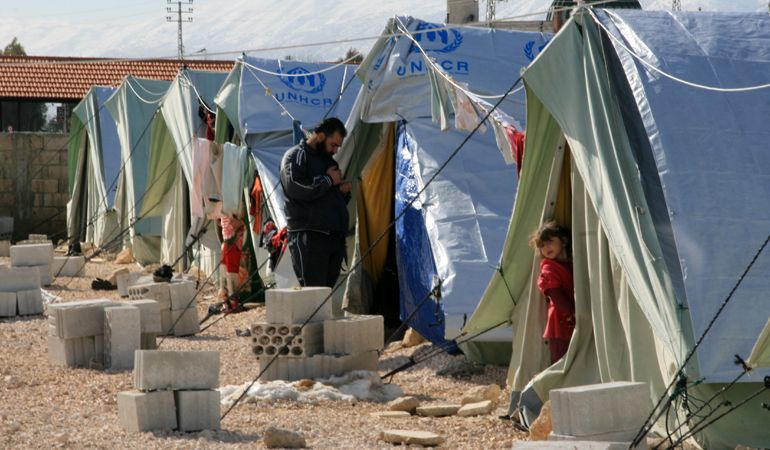Syrians in Lebanon: ‘Glass cannot fit one more drop’
Thousands of Syrians in Lebanon are in flux after the government ordered UNHCR to stop registering new refugees.

Beirut – Nour is 20 and has nothing. The house where she used to live with her parents and two-year-old son in rural Damascus was hit by a rocket during a battle between the Syrian regime and Jabhat al-Nusra, prompting her to flee the country with her son.
“I spent days walking between bombs,” Nour, who did not provide a last name, told Al Jazeera. Her husband disappeared more than two years ago. Two months ago, Nour finally reached the Lebanese border and secured a tourist visa to enter the country – but she is now broke and living with her sister.
Keep reading
list of 4 itemsAustralian war crimes whistleblower David McBride jailed for six years
Will Israel’s war on Gaza sway South Africa’s election?
Masked Tunisian police arrest prominent lawyer for media comments
Nour hoped to be registered as a refugee by UNHCR in order to obtain a bit of assistance, but a few days before her appointment date this month, she was informed that her appointment had been cancelled.
Thousands of Syrians are in her same situation after UNHCR stopped registering Syrian refugees in Lebanon in early May, responding to a request from the Lebanese government, which is aiming to restrict the presence of Syrians in the country. As a result, newly arriving Syrian refugees will be unable to access international assistance and protection, making them even more vulnerable.
RELATED: Syrians worried over Lebanon’s new visa rules
“UNHCR works in countries around the world with the permission of the government, so we cannot ignore a direct order from the government,” UNHCR’s representative in Lebanon, Ninette Kelley, told Al Jazeera. “But at the same time, we do enter negotiations with them to discuss the consequences of not being able to do certain things.”
Since border restrictions have been put in place, far fewer refugees are coming into Lebanon through official borders.
Those discussions are still ongoing, she said, but for now, non-registered Syrians cannot access the benefits associated with registration, including health services, shelter support and legal advice, as well as the possibility to apply for resettlement.
“We hope this is a temporary decision. We do believe that registration is a very important tool, not just for us to help refugees, but for the government as well,” Kelley said.
According to Lebanon’s Minister of Social Affairs, Rashid Derbas, the primary reason for the government’s request is that the country has reached its capacity for Syrian refugees. “The glass cannot fit one more drop,” Derbas said. “Now we have 1.2 million [refugees]. I think this is a very exceptional proportion.”
Indeed, Lebanon has the highest per-capita concentration of refugees worldwide, with 25 percent of its population comprised of Syrian refugees. The situation has provoked social, economic and political challenges, amid increasing pressure on the country’s resources.
Khalil Gebara, an adviser to Interior Minister Nohad Machnouk, told Al Jazeera that the decision is firm. “The government took a decision last October that included new border measures for all Syrians and also asked [UNHCR] to stop registering refugees unless in very exceptional humanitarian cases. Since the beginning of this year UNHCR has registered thousands of new Syrians, which is basically in contradiction with the Lebanese decision.”
For years, due to the historic ties between Syria and Lebanon, there have been almost no restrictions for Syrian citizens to travel, reside and work in Lebanon. But according to the new regulation issued in October and implemented in January, Syrians must get a visa at the border under one of a number of criteria, such as tourism, work, or medical, among others. There are also “humanitarian exceptions” that allow some refugees to obtain a special permit “under exceptional circumstances to be finalised by the Ministry of Social Affairs”, according to UNHCR. Alternatively, Syrians can get a Lebanese sponsor.
|
|
Derbas says that so far, only 15 to 20 people have obtained the humanitarian permit. An NGO officer working in registration, who asked to remain anonymous, told Al Jazeera: “Since these categories came into effect, most Syrians I’ve met entered with [a] tourism visa.” Such visas are only valid for a short duration.
RELATED: Syrians risk their lives to build luxury in Lebanon
The last time UNHCR published the number of people waiting to be registered, which was in early April, there were around 11,000 Syrians on the list. But the number of non-registered Syrians in Lebanon who would be affected by the latest measure is even bigger, humanitarian workers say.
Ten days before the interruption of the registrations earlier this month, the government told UNHCR that registered refugees who entered Lebanon after the regulation implemented in early January had to be de-registered, as their registration ran counter to the government’s October decision. A total of 1,471 people were affected by the order, losing their benefits.
Chadi, a refugee who did not provide a last name, said the measure took him by surprise when he went to register his wife. Not only was she rejected, but he was de-registered. Once a wealthy branch manager in Hasaka, Chadi lost everything during the war and says his savings will only last four more months.
In addition, since last year, the Lebanese government has tightened the conditions under which Syrians can renew their residence permits and, for those in the country illegally, regularise their status. Several humanitarian groups say the number of refugees residing in the country illegally has increased dramatically, as many Syrians enter Lebanon through unofficial border crossings.
“Since border restrictions have been put in place, far fewer refugees are coming into Lebanon through official borders,” Kelley said. “Our registration statistics show a drop between 75 and 80 percent a month from what they were last year. Those regulations have had the impact that the government intended them to have.”